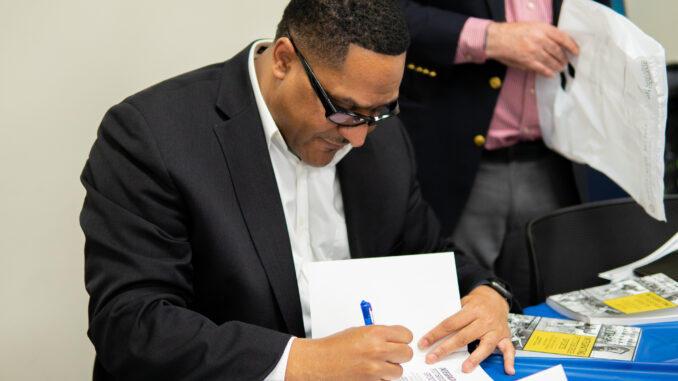
Russell Macias | Staff Writer
Feb. 23, 2023
It was Dec. 3, 1949, and the Duquesne men’s basketball team was scheduled to play Tennessee. At that time, it was well-known that if a team played Tennessee, they had to bench their Black players, or else Tennessee would refuse to play.
Duquesne intended to play Chuck Cooper — a Black player on its team — no matter what, and they refused to bend the knee to Tennessee.
When Duquesne didn’t acquiesce, Tennessee left and the game was forfeited.
Media professor Robert Healy III shared that story from the new book, “Integrating Pittsburgh Sports,” on the panel of Association of Gentleman Pittsburgh Journalists, held last Thursday in Gumberg Library.
Members of the panel participating in the event included Duquesne alumni, Healy, KDKA sports host Josh Taylor, Tom Rooney of the Rooney family and author David Finoli. Panelists also included Chris Fletcher, Douglas Cavanaugh, Bill Ranier and Samuel Black.
The panel was hosted by another Duquesne graduate, Shelby Cassesse of both KDKA and the Pittsburgh Steelers.
The panel’s discussion highlighted the contents of their new book, which speaks on various aspects of how the integration of sports had a lot of firsts here in Pittsburgh. The purpose of the book is to share players’ stories that were lost to time. Each chapter of their new book centers on one athlete in particular and tells their story.
Some of the athletes and sports figures mentioned included Chuck Cooper, Roberto Clemente, Bill Nunn, Charles West and Cumberland Posey.
Specifically, the panel discussed Cooper, the first Black basketball player to be drafted into the NBA at length.
Cooper played collegiately at Duquesne. He was a consensus second-team All-American in 1950, and Duquesne retired his No. 15. The UPMC Cooper Fieldhouse is also named in his honor.
His story begins right here in Pittsburgh, in the Westinghouse neighborhood, where he went to high school and played basketball.
From there, he went to West Virginia State, before he was drafted into the United States Navy at the end of World War II. Then, he returned home and began attending Duquesne.
Behind his strong play, Duquesne went a blistering 78-19, and the team was twice invited to the then-most prestigious postseason tournament, the National Invitational Tournament.
Famously, during his senior season when he was captain, he became the first Black individual to play in a college basketball game south of the Mason-Dixon Line. Cooper was inducted into the Naismith Basketball Hall of Fame in 2019.
At the panel, one student asked why more people are not aware of stories like these, and why Chuck Cooper’s name and story are not synonymous with Duquesne.
“This is why we do this, that’s why this book is here,” Healy said. “It has to start somewhere, and there’s no better place to do so.”
As the night moved along, another common theme was the power that sports can have in social situations. Panelists agreed that Pittsburgh’s racial diversity aided in the city’s sports integration.
Prior to that, the roles that the Pittsburgh Crawfords and Homestead Grays — the city’s two Negro League baseball teams — played were hugely important.
“Sports can open doors in areas of life unlike anything else,” Black said.
Rooney said that Pittsburgh is a city that’s racial forwardness is often forgotten. The effect that the Negro League teams had on the city was profound, and all races attended those games to see players like Josh Gibson, a bonafide baseball superstar.
Another big piece of the Pittsburgh story with integration of sports was the role of the Pittsburgh Courier. The Courier was specifically made by and for the Black people of the time.
Its influence was vast, and it held the power to make people overnight celebrities by printing their stories.
Panelists said that at its peak, the Courier had 400,000 subscribers, with an estimated additional million readers.
“Integrating Pittsburgh Sports” also tells the story of famed reporter Wendell Smith, who not only recommended Jackie Robinson to Branch Rickey, but traveled all around the country with Robinson to tell his story firsthand, directly facing the discrimination head on.
Thursday’s panelists discussed their favorite chapters at the end of the event. Another powerful moment came when Finoli said that, during his interview with Stew Johnson — a professional basketball player throughout the 1960s and 1970s — “the pain in his voice [was still] very evident, over 50 years later.”
Finoli said that too often, we like to pretend that racial and social integration are extremely distant, that the wounds of the past have been fully healed and that we, as a society, have moved past it. But that pain referenced in Johnson’s voice is still echoed by players across sports today.
“This history is all around us, and it seems nobody even knows even a little bit of it,” Taylor said.
In the same way, Healy expressed hope that their new book could further racial dialogue and Pittsburgh’s role in sports integration, particularly in honor of sports legends like Chuck Cooper.

